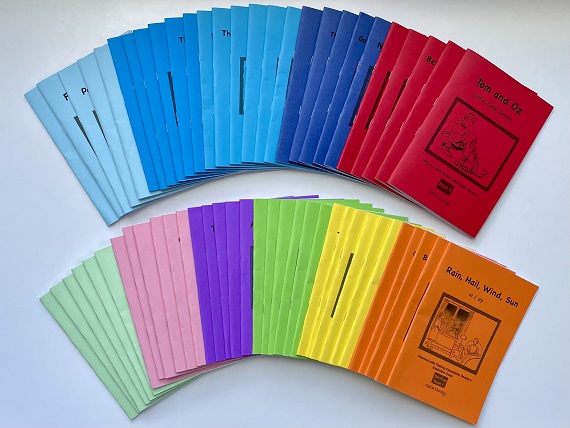“Can I halp you?” The Salary-Celery merger
0 RepliesIf you’re in south-eastern Australia or New Zealand, you’ve probably noticed kids pronouncing words with /e/ (as in ‘egg’) more like /a/ (as in ‘at’) before the sound /l/.
They say things like ‘Can I halp you?’, ‘I falt a bit sick’ and ‘I can do it mysalf’. They pronounce ‘salary’ and ‘celery’ as homophones, hence the name linguists have given this vowel shift: the Salary-Celery merger.
The ‘a’ before /l/ in ‘asphalt’ was being pronounced /e/ when I was scraping my knees on it at school, but ‘a’ pronounced /e/ mainly occurs before /n/, as in ‘any’, ‘many’, ‘secondary’ and ‘dromedary’.
Several other vowels have also morphed a bit before /l/, consider:
- all, ball, call, fall, gall, hall, mall, also, almost, always etc (but not ‘shall’, ‘ally’, ‘alley’, ‘ballad’, ‘gallop’, ‘pallet’, ‘tally’ or ‘alas’).
- walk, talk, chalk, stalk, and baulk (US balk) and caulk (US calk).
- half/halve, calf/calve, behalf (but not ‘salve’ or ‘valve’).
- salt, halt, malt, gestalt, alter, exalt, Walter (but not ‘shalt’).
- fault, vault, cauldron, assault, cauliflower, hydraulic, somersault (but not ‘haul’ or ‘maul’).
The sound /l/ has a vowel-like quality and tends to ‘colour’ the preceding vowel. This is useful for teachers to know, so they can give any confused kids plenty of practice spelling affected words (there’s lots of opportunities to practice writing ‘short vowels’ in a range of phonetic contexts, including before /l/, in Spelfabet Workbook 1)
When kids insist that they hear an /a/ (as in ‘cat’) in ‘halp’, I ask them to say the word in their ‘spelling voice’ (as it’s written), with /e/ (as in ‘red’). Good spellers often say that they pronounce odd spellings a bit weirdly when writing them (Wed-nes-day, bus-i-ness), as a kind of mnemonic. Spelling pronunciations sometimes crop up in comedy too, for example the kniggits in Monty Python and the Holy Grail.
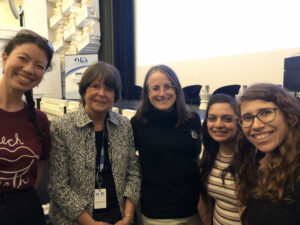
US reading/spelling guru Professor Linnea Ehri was recently here in Melbourne courtesy of Learning Difficulties Australia (the selfie at right proves we met her), and talked about this strategy, which she calls the “Spelling Pronunciation Strategy”. She says that in Connectionist theory, to put a word’s spelling into long-term memory, the letters must be connected to ‘phoneme mates’ in the pronunciations of the word.
To use the Spelling Pronunciation Strategy (AKA “Spelling Voice” in the program Sounds-Write) you separate and say each syllable with stress, and pronounce all the letters. Prof Ehri’s examples were “ex cell ent ”, “lis ten”, “choc o late”, and “Feb ru ary”. She cited two studies (Drake & Ehri, 1984 and Ocal & Ehri, 2017) showing that assigning spelling pronunciations enhanced memory for spellings, in 4th graders and college students.
So in summary, it’s not just harmless to say words in a slightly funny way to halp, sorry, help yourself remember their spellings. It’s officially evidence-based.
Phonics With Feeling Set 10 now available
1 Replies
I’ve just put six brand new Set 10 Phonics With Feeling printable decodable readers into the Spelfabet website shop. Like all these books, they cost 40c per print to make 5 copies, or 20c per print to make 30 copies. You provide the paper/card, printer and assembly time, which of course adds to the real cost, but if you’re short of funds, these are a very affordable way to boost your library of decodable text.
(more…)What sounds did you SAY (not just hear) in that word?
0 Replies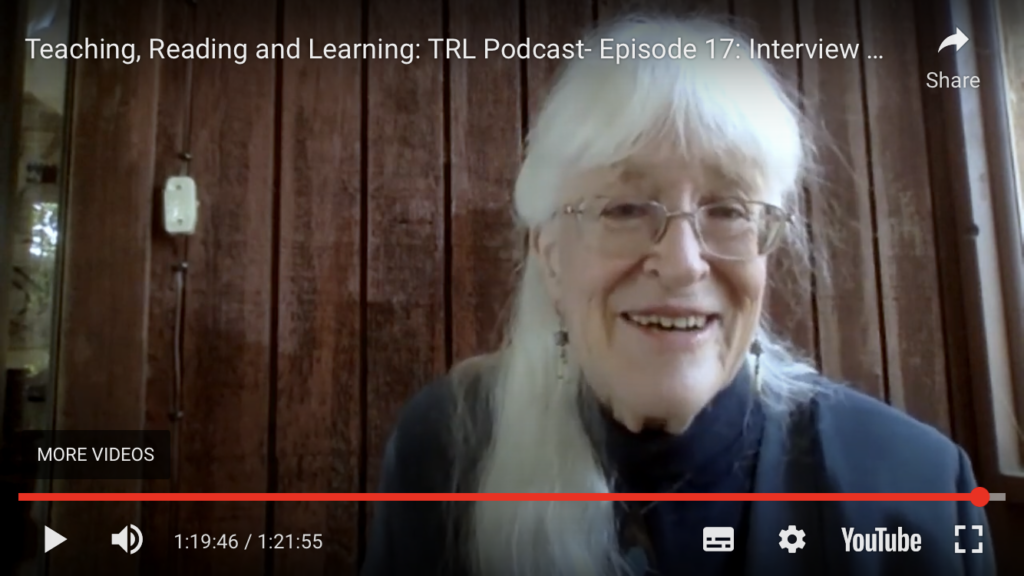
If you haven’t listened to the US Reading League’s podcast with Dr Jeannine Herron, or watched it on YouTube, I highly recommend it. She’s an inspiration, the perfect tonic if you’re feeling a bit wearied by swimming-through-COVID-mud, as I am.
At 84, she has a wonderful laugh, rogue chickens, and is planning to write a new program, not resting on her life’s laurels as a teacher, activist, research scientist, adventurer, writer, editor, and a program and software developer.
(more…)New printable decodable books, including an extra free one
2 RepliesTo celebrate the removal of predictable texts and multicueing from the Australian National Curriculum (yippee!), more Phonics with Feeling printable decodable books are now available from the Spelfabet website.
These provide an affordable way to help Year 1 and 2 students, advanced Foundation students, and slightly older strugglers to build decoding skills. They are longer than most decodable books, allowing for cohesive narratives, entertaining plots, engaging characters, and themes worth talking about.
(more…)New 2 ways to spell vowels cards, including a free deck
0 Replies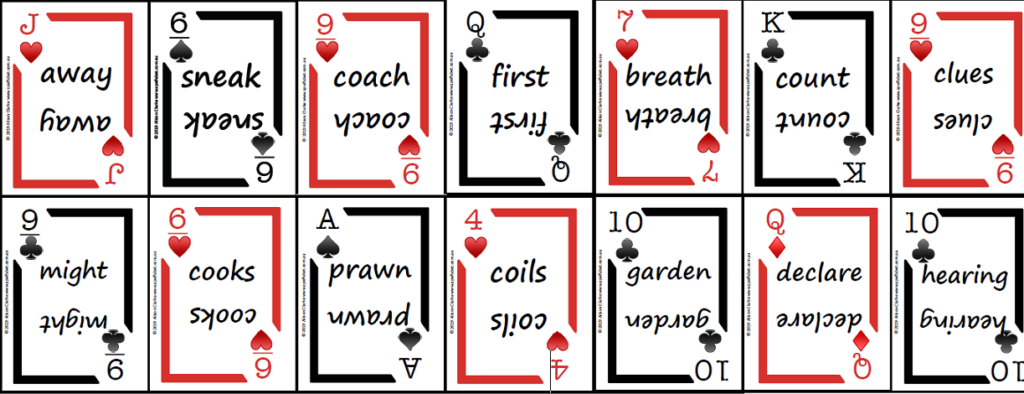
Some students need smaller-than-average steps and extra practice to get spelling patterns into long-term memory. Games are a great, nag-free way to get in lots of targeted, extra repetitions.
The newest set of download-and-print Spelfabet phonics playing cards has 14 decks, each with one vowel sound spelt two ways, and includes a free sample deck:
(more…)Why do we say the past tense suffix -ed three ways?
13 RepliesYoung children learning to sound out words often write ‘jumped’ as ‘jumpt’ or ‘jumt’. They write the verb ‘filmed’ as ‘filmd’ and ‘landed’ as ‘landud’ or ‘landid’, depending on their accent.
They’re writing what they say/hear, which is great, but English has a special spelling for the regular past tense suffix: -ed. This spelling shows readers that, for example, the intended meaning is ‘packed’ (the bag) not ‘pact’ (between two countries).
But why do we pronounce this suffix three different ways? Why do we also have three pronunciations for regular plural and third person present inflectional suffixes, as in ‘kicks‘ (sounds like /s/), bends‘ (sounds like ‘z’) and ‘wishes‘? (sounds like /es/ or /uz/, depending on your accent). And what’s an inflectional suffix, anyway?
Here’s my third Fun Spelling Facts for Grownups video, in which I try to relate the visible part of our writing system (orthography) to the sounds (phonology) and meanings (morphology) in our spoken language. It’s 7.5 minutes long (yes, I talk too much), but the past tense -ed part is first. Hope it’s useful.
Spelling for grown-ups 1: /s/ spelt C and /j/ spelt G
17 Replies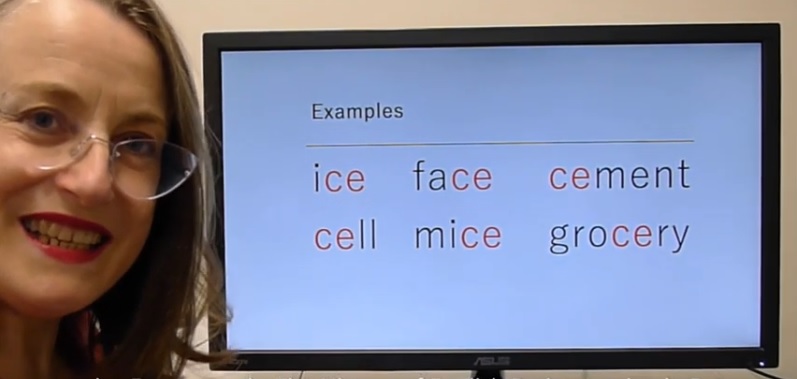
Hooray for recent media reports of a greater emphasis on phonics in the draft Australian National Curriculum.
I’m not a fan of some of the other proposed changes, but more and better teaching of phonics and word-building should prevent a great deal of reading/writing failure, especially among disadvantaged students.
Unfortunately, adults – including many teachers – tell me that they were never taught much about how our spelling system works. This makes it hard for them to teach it well.
I’ve therefore started making a series of what I hope are helpful 5-minute videos for adults about major spelling patterns. Here’s the first one:
Once teachers understand our spelling system, and aren’t hamstrung by unhelpful curriculum requirements, they’ll drop unhelpful spelling-teaching approaches like rote-memorisation of high frequency wordlists, silently writing the same word in many different colours, and other activities not focussed on linking a word’s sounds, spellings and meanings.
Teachers will be able to systematically, explicitly and authoritatively teach how speech sounds are represented by spellings, and how many long words are built from meaningful parts with special spellings. This will help many more children learn to spell and read successfully.


